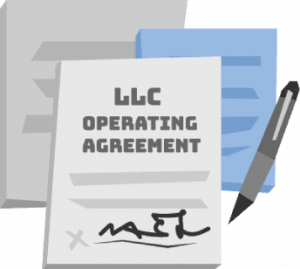How To Start An LLC In North Carolina
In North Carolina, LLCs are required to file an application with the state called Articles of Organization. This form has a $125 filing fee. But it doesn’t stop there. Your North Carolina LLC will also need to find a registered agent, get a domain name, open a bank account, and more. Let’s get started.

1. Name Your LLC
Limited liability companies in North Carolina must follow the rules laid out in N.C. Gen Stat § 55D-20. Your LLC name needs to:
- Include a designator like LLC, limited liability company, or another allowable indicator.
- Not include any words prohibited for use in North Carolina business names (for example: “Bank” or “Architect”) unless you have proper approval.
- Not contain any offensive words.
Your name CANNOT be the same as another registered North Carolina business. (A quick North Carolina business name search can tell you if your name is in use already.) You can have the same name as a business in a different state as long as there’s no federal trademark.
Tip: Have the perfect name in mind but not ready to file your formation docs? You can file an Application to Reserve a Business Entity Name with the North Carolina Secretary of State. The form costs $30 to file and will reserve your business name for 120 days.

2. Get a Domain Name
A website domain that matches your business name will improve search engine visibility, driving more customers to your doorstep. Northwest makes it easy and can get you a domain instantly. In fact, all of our LLC customers get:
- One year of free domain registration.
- A customizable business website that’s kept safe with top-shelf SSL security.
- Up to 10 professional business email addresses.
- A business phone number with local area code.
- Friendly Corporate Guides®; have questions about a filing or form? We have answers!

3. File North Carolina LLC Articles of Organization
An LLC in North Carolina isn’t legally formed until the Articles of Organization are accepted by the North Carolina Secretary of State. It costs $125 to file your Articles in North Carolina.
Here’s what you’ll include:
Remember to double check that the name is unique in North Carolina, or your Articles will be denied.
Your business address doesn’t have to be your actual office address or your home address. It just has to be a real, physical North Carolina address. (That means no PO boxes.)
This address WILL be part of the public record. So whatever address you put here, make sure you’re okay with it being available. If you’re worried about your privacy, you can put your registered agent’s address.
A registered agent is a person or business that accepts legal mail, like service of processes/lawsuits, on the behalf of a business. In North Carolina, every LLC must have a registered agent.
Per N.C. Gen Stat § 55D-30, your North Carolina registered agent must:
- Have a street address (no P.O. Boxes or virtual offices) in the state of North Carolina.
- Maintain regular business hours, 9 AM to 5 PM.
- Agree to accept legal mail on behalf of your business and forward it to you fast.
You can be your own registered agent. The downside is that you’ll have to use own name and address on your Articles, which will be made public. The other option is hiring a service, like Northwest, to be your registered agent. This ensures that you can live more privately with your LLC while still having clear protections.
Your executor (or company applicant) is the person who files the Articles of Organization for your business. For example, if you file yourself, that’s your info. If you hire us to form your business, it’s ours. The personal information listed here goes on the public record.
There’s a handful of information that you could add to your Articles, but isn’t legally required. This includes:
- Principal address.
- Professional services.
- Company officials. (LLC’s members and/or managers.)
- Members’ duties and rights.
- Business email. (This is where the Secretary of State will send notifications.)
- Managers. (Your bank may require you do this.)
- Effective date up to 90 days in the future.
LLC members are the LLC’s owners. A manager is someone appointed by the LLC to run the day-to-day operations of the business.
How do you “file” North Carolina Articles of Organization?
You can submit your articles online, by mail, or in person. Just remember there’s a $125 filing fee to go along with your submission.
Mail:
North Carolina Secretary of State
Business Registration Division
P.O. Box 29622
Raleigh, NC 27626
In person:
North Carolina Secretary of State
Business Registration
2 South Salisbury Street
Raleigh, North Carolina 27601-2903
Online:
North Carolina Online Registry

4. Adopt an Operating Agreement
An operating agreement is not legally required in North Carolina. We include it because it gives your business a user’s manual to look at when complications arise. Your operating agreement can include pretty much anything, but generally has things like voting procedures, how to allocate profits, and how to resolve conflict.
Operating agreements might also be helpful opening a business bank account, depending on the bank you’re using. Otherwise, they are internal documents—meaning you don’t need to share it with anyone outside the business.
Tip: Our attorneys have drafted a simple North Carolina operating agreement you can base yours off of, tweak a little, or use as is. Use it for free.

5. Get an EIN
An Employer Identification Number (EIN) is like your business’ social security number. You need an EIN to open a business bank account, apply for loans, and, most crucially, pay and file taxes.
You can get your EIN from the IRS. Got the oh-no-the-IRS hives? We’ve got you. You can hire us to get your EIN for you.

6. Get a Business Bank Account
Most people open an LLC in order to get liability protection (that is, the legal separation between you and your business.) But if you don’t keep your personal money and your business’ money separate, and your LLC is sued, a judge can rule that you aren’t actually a separate entity. A business bank account helps bolster your liability protection.
In North Carolina, you’ll need a few things to open a business bank account, though this can vary bank to bank. Generally speaking, you need:
- North Carolina LLC Articles of Organization (a copy is fine)
- the LLC’s operating agreement
- the LLC’s EIN
- an LLC Resolution to Open a Bank Account (if your LLC has more than one member)

7. File Annual Report
Limited liability companies in North Carolina have to file an annual report. Your annual report is due on April 15th every year. It costs $200 to file ($203 if you file online). Your annual report should include the:
- Name and address of the company.
- Name and address of your registered agent in North Carolina. (Plus original signature if you are changing your registered agent at this time.)
- Names and addresses of members/managers or directors/officers.
*This is informational commentary, not advice. This information is intended strictly for informational purposes and does not constitute legal advice or a substitute for legal counsel. This information is not intended to create, nor does your receipt, viewing, or use of it constitute, an attorney-client relationship. More information is available in our Terms of Service.
Let’s Set Up Your North Carolina LLC!








